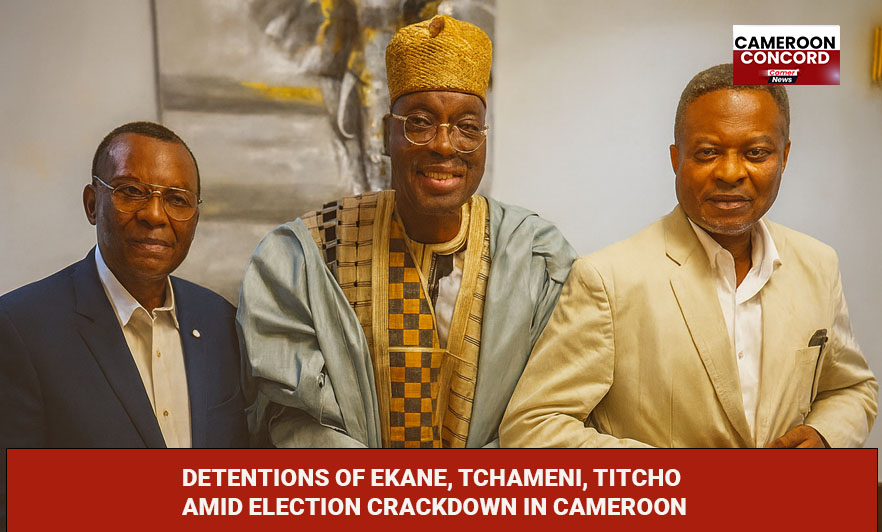- Details
- Politics
Douala Arrests Signal Regime Panic as Crackdown Widens
[YAOUNDE, Oct 25] – Cameroon’s security services have widened a coordinated sweep against opposition voices, detaining Anicet Ekane (MANIDEM), Djeukam Tchameni, and Florence Titcho (party treasurer) in operations centered on Douala and Yaoundé, while Yerima Riré, a supporter of Issa Tchiroma Bakary, was reportedly abducted overnight in Garoua by men in uniform. Families and lawyers say they have received no formal charge sheets or access details—classic markers of unlawful detention.

The claims used to justify the arrests follow a pattern the country knows too well: a “false weapons” narrative, home searches without transparent warrants, and hurried media briefings to brand critics as security threats. Civil society figures, lawyers, and tech entrepreneur Rebecca Enonchong describe the round-up as “a sign of desperation from a regime that has lost at the ballot box,” warning that the target is not a handful of leaders but the electorate that empowered them.
In parallel, the Union for Change coalition denounced what it calls “political abductions”, citing a reported Rapid Intervention Battalion (BIR) role in seizing Tchameni from his residence and taking him to an undisclosed location, with Ekane detained under similar circumstances hours later. A press conference convened in Douala and online—featuring Mme Makini Tchameni, Maitre Alice Nkom, Maitre Njifen, Philippe Nanga, Rebecca Enonchong, and Kah Walla—urged journalists to demand warrants, custody locations, and medical access, and to scrutinize any “evidence” presented after-the-fact.
A well-rehearsed toolkit
Election observers and rights advocates trace the same choreography across years of crisis politics:
-
Night-time arrests without timely notification to counsel or family.
-
After-the-fact “discoveries” of arms or “insurrection” material displayed to cameras but opaque in chain of custody.
-
Administrative silence on detention locations, producing de facto enforced disappearance conditions in the crucial first 48 hours.
-
Instrumentalized prosecutions to chill mobilization ahead of key announcements (here, the Constitutional Council’s proclamation).
Veterans of Cameroon’s civic space recall the Enoh Meyomesse affair, where sweeping claims of “war materiel” and coup plotting were used to neutralize a dissident voice; similar staging and media theatrics were seen during phases of the Anglophone crisis and post-2018 election protests. Today’s arrests land in the same mold—criminal labels first, evidence later.
Why now
Two dynamics collide. First, the public ledger of polling-station PVs—filmed, photographed, and posted—has eroded the regime’s monopoly over narrative. Second, the street pressure in the Grand North (Garoua, Maroua, Ngaoundéré, Guider, Kaélé) has grown more organized despite intermittent connectivity throttling. In this environment, detaining visible organizers and ideologues becomes a short-term method to buy time ahead of the Constitutional Council’s ruling.
Yet the tactic is high-risk. Families report fragile health for some detainees; secrecy over location and medical access deepens public anger and international attention. Enonchong’s blunt assessment—“be ready to arrest all Cameroonians”—captures the political cost: each arrest broadens, not narrows, the circle of dissent.
Legal stakes
Cameroon’s law guarantees prompt presentation before a competent authority, access to counsel, and the right to be informed of charges. The display of “seized” weapons absent verifiable warrants, timestamps, and chain-of-custody logs will not meet due-process standards. If the state claims insurrection or public-order threats, it must produce individualized, testable evidence, not collective imputations against opposition groupings.
As of press time, authorities have not issued a detailed, verifiable account of the grounds for arrest, nor clarified detention sites for Ekane, Tchameni, Titcho, or the whereabouts of Yerima Riré. Cameroon Concord is seeking official comment from the Gendarmerie and the Ministry of Defense.
The bigger picture
This crackdown arrives as the nation has opted for change—expressed through polling-station procès-verbaux and civic mobilization. The criminalization of dissent and manufacture of “evidence” are not signs of control; they are indicators of political exhaustion. Whether the Constitutional Council chooses transparency, orders independent verification, or defaults to ritual validation will decide if the law still has authority—or merely costume.
Bottom line: The arrests of Ekane, Tchameni, and Titcho, alongside the abduction report of Yerima Riré, are not isolated acts; they are the return of an authoritarian toolkit at the very moment the public demands legality, openness, and a peaceful handover of power.
- Details
- News Team
- Hits: 172
